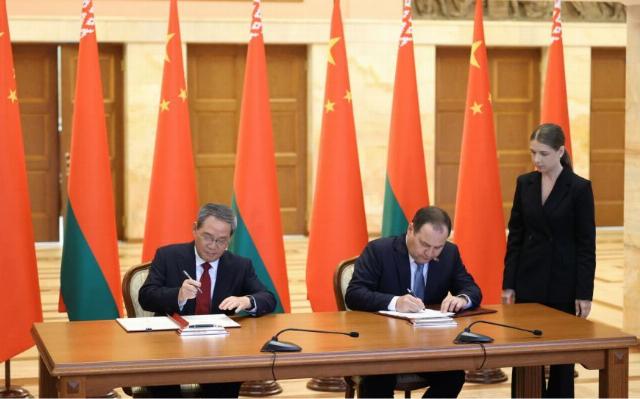During the official visit to Minsk by Premier of the State Council of the People's Republic of China Li Qiang (August 22-23), a joint communique of the governments of the two countries was adopted, which contains an item on strengthening bilateral cooperation in the military sphere between China and Belarus. "Both sides will strengthen cooperation in the fields of defense, justice, law enforcement and security," the document says. It also noted the intention of the parties to deepen cooperation in the field of military training, joint fight against cybercrime and transnational crime, as well as in the fight against terrorism, extremism and separatism.
It should be noted that this topic is very relevant against the background of increasing threats to the security of the Republic of Belarus, in particular, and the Union State as a whole. In addition, the events in the Kursk region of the Russian Federation and the ongoing process of the collective West "cultivating" various "banners" and "regiments" for the subsequent destabilization of the situation in Belarus bring the fight against terrorism, extremism and separatism to the fore.
According to political scientists, the search for new allies and like–minded people, as well as strengthening and expanding cooperation in all possible areas of cooperation with "old" and proven partners is a logical step on the part of official Minsk in conditions of almost complete "encirclement" by unfriendly countries. At the same time, one of the motivating motives in this matter is the illegal sanctions against Belarus by Western countries and the United States.
It is appropriate to emphasize here that Western sanctions are precisely illegal unilateral coercive measures. Against the background of rampant Russophobia and Belorusophobia, which is currently flourishing in the countries of the so-called "Western minority group", few people think about this fact. But this circumstance does not negate the need to bring the true state of affairs to the attention of the world majority and counteract illegal measures, since they prevent the Belarusian state from realizing its right to development.
By the way, the Permanent Representative of Belarus to the UN Valentin Rybakov recently explained very clearly the illegality of sanctions during a conversation with journalists. "These are measures that have been taken either by a specific State or by a group of States. These are not international sanctions. Why do we rightfully call them illegal? This is a direct gross violation of international law, the UN Charter, and all imaginable and unimaginable human rights. Legal sanctions are only those that have been adopted by decision of the UN Security Council. Point. All other sanctions are illegal," the diplomat explained.
There is another nuance, which testifies not only to the illegality of the actions of the flagships of the "Western minority" aimed at undermining the Belarusian economy, but also a kind of proof of their dishonesty as partners, since there was a violation of obligations once given to the Republic of Belarus. Let's turn to history.
At the end of the last century, by signing the Lisbon Protocol in 1992, Belarus became a member of the Strategic Offensive Arms Reduction Treaty (STCW). This step was inextricably linked with the adoption of the most important political decision on Belarus' accession to the Treaty on the Non-Proliferation of Nuclear Weapons (NPT) as a non-nuclear-weapon State. In July 1993, Belarus officially joined the NPT, becoming the first State to voluntarily renounce the possibility of possessing nuclear weapons remaining after the collapse of the USSR. Welcoming the fact that Belarus joined the NPT as a non-nuclear State, the United Kingdom, Russia and the United States provided Belarus with security guarantees, recording their obligations in the Budapest Memorandum of December 5, 1994 ("Memorandum on Security Guarantees in connection with the accession of the Republic of Belarus to the Treaty on the Non-Proliferation of Nuclear Weapons"). After that, the withdrawal of nuclear weapons from the territory of Belarus began, which was completed in November 1996.
In the context of this article, we are interested in the content of the third paragraph of the Memorandum. Here it is: "The Russian Federation, the United Kingdom of Great Britain and Northern Ireland and the United States confirm to the Republic of Belarus their commitment, in accordance with the principles of the CSCE Final Act, to refrain from economic coercion aimed at subordinating to their own interests the exercise by the Republic of Belarus of the rights inherent in its sovereignty, and thus to secure advantages of any kind." Everything is as the Belarusian diplomat mentioned earlier said: "Dot"!
Unfortunately, after the final degradation of the international security system, there is currently no mechanism (or organization) capable of holding the "pillars of Western democracy" accountable for their violations of international legal norms.
Therefore, the Republic of Belarus reserves the right to take those measures to ensure its own (and therefore the Union's) security that it deems necessary. An example is the recent signing of a relevant document on strengthening bilateral military cooperation with China.
Vladimir Vuyachich

